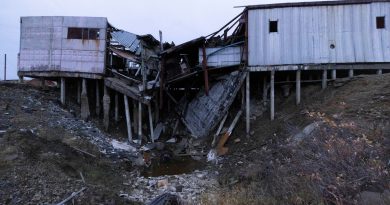Politics prompted hasty review of Shell’s Arctic play

Regulators hoping to avoid criticism and potential congressional backlash rushed an environmental review of offshore Arctic oil development to ensure that Royal Dutch Shell would be able to drill this year, said a report issued Monday by a federal watchdog agency.
The investigation, conducted by the U.S. Department of Interior’s Office of the Inspector General, was launched in response to complaints from Bureau of Ocean Energy Management employees who worked on a rewrite of the supplemental environmental impact statement for oil leasing in the remote Chukchi Sea off Alaska’s northwest coast.
The supplemental EIS, made final in February, was the court-ordered result of a lawsuit that challenged a record-breaking 2008 Chukchi Sea lease sale, the auction in which Shell spent $2.1 billion to acquire exploration tracts.
The inspector general’s report issued Monday did not find fault with the supplemental EIS’s ultimate findings — which affirmed the 2008 lease sale — or the science used to back that finding.
Tight timeline compromised quality
However, the report said, the expedited timeline to complete the environmental review was cited by past and present employees as the cause of low morale and some early retirements and worker departures from the agency.
A fish biologist who worked on the supplemental EIS and was interviewed for the report told investigators that the tight timeline “significantly compromised” the quality of the environmental review. An oceanographer who was also interviewed “said that she had never worked on an SEIS with such a short timeline in her 26-year career,” the report said. A former regional supervisor told investigators she expressed several times that the short timeline would compromise the quality of the EIS.
According to the report, Department of Interior Chief of Staff Tommy Beaudreau told investigators that he considered pressure and potential criticism from Alaska’s congressional delegation — the report mentions Sen. Lisa Murkowski by name — when establishing the timeline for completion of the environmental review. A request for comment from representatives for Murkowski was not immediately returned Monday night.
In setting the timeline, Beaudreau said he would sign off on overtime and suggested additional employees be dedicated to the review, according to the report.
“Beaudreau … knew that Congress could impact BOEM’s budget and authority, and he did not want to give it a reason to do so,” the report said.
Political pressure
By completing the EIS quickly, Beaudreau also sought to “protect DOI from blame” if Shell was unable or unwilling to drill in the 2015 season, the report said.
“Beaudreau said that it would not be unexpected for industry’s failures to be characterized by industry and Congress as a regulatory failure,” if Shell’s venture ultimately proved unsuccessful, the report said.
Shell indeed cited a “challenging and unpredictable federal regulatory environment” — among other considerations — when it announced in September that it would abandon its offshore oil dreams in the Alaska Arctic.
An attorney representing the environmental and Native groups that sued to stop the 2008 lease sale said the inspector general’s report contradicted claims that the Department of Interior was slowing down Shell’s drilling plans.
“The report also shows that the political pressure to get this done quickly overwhelmed the careful science, analysis, and public engagement that the law and good decision-making demand,” Erik Grafe, an attorney for the environmental law firm Earthjustice, said in an email.
The plaintiffs continue to challenge the lease sale held nearly eight years ago, despite Shell’s withdrawal from the region. In an amended complaint filed in September in U.S. District Court, they add new justifications to their argument that the lease sale should be voided.
The amended complaint accuses BOEM of finishing its supplemental EIS “on a schedule specifically aimed at completing the document and reaching a decision in time to allow Shell to explore its leases during the 2015 open water drilling season.”
-By
Related stories from around the North:
Canada: Energy challenges in Canada’s North, Eye on the Arctic
Finland: Helsinki City Council to close coal plant, Yle News
Norway: Japan wants wind power from Arctic Norway, Barents Observer
Russia: No alternative to Arctic oil says Russia environment minister, Barents Observer
Sweden: Will Sweden be able to produce enough energy in the future?, Radio Sweden
United States: New Alaska rules may help renewable energy projects, Alaska Public Radio Network



